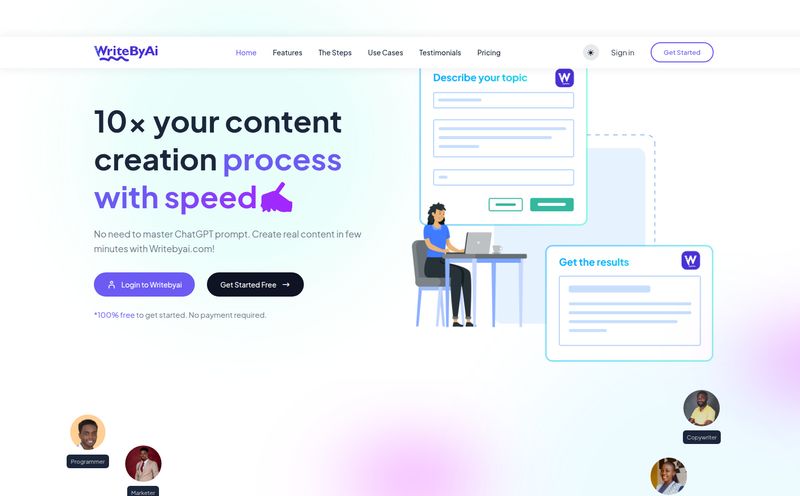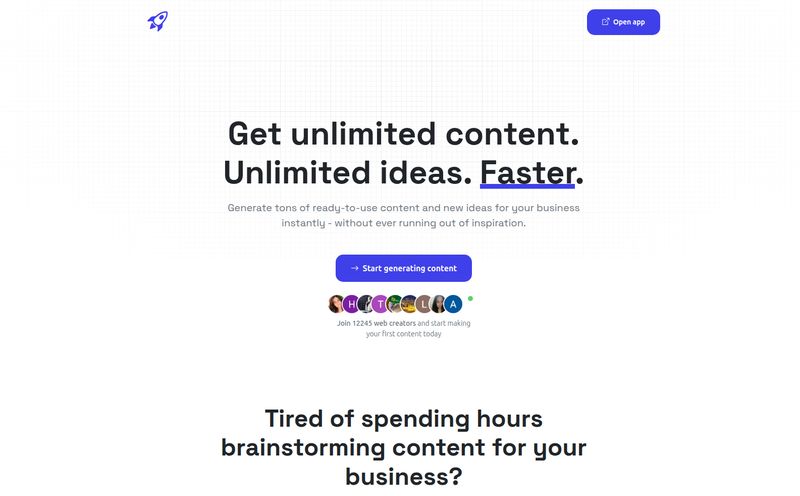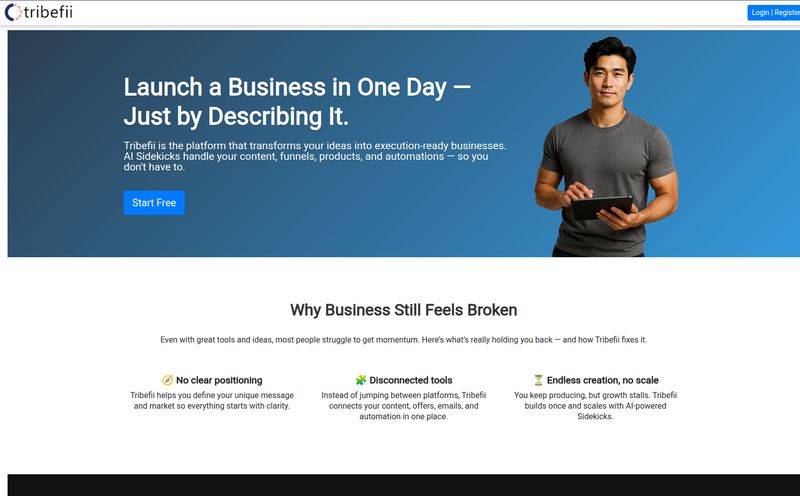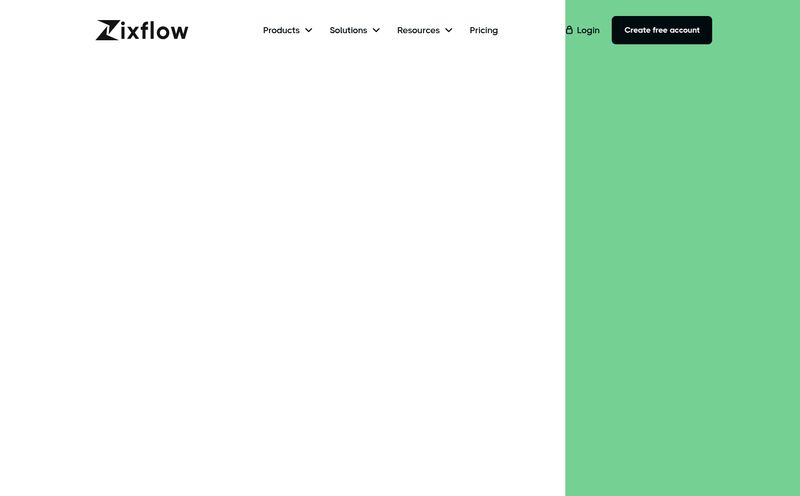I see it all the time. A founder, usually someone with a deeply technical background, shows me their product. It's elegant. It's powerful. It solves a complex problem with a kind of beautiful, algorithmic precision that I can only admire. Then I ask them, "Okay, so who are you selling this to and what's your pitch?"
Nine times out of ten, the answer is a variation of rambling features, technical specs, and a fundamental misunderstanding of what a customer actually cares about. It's the classic curse of the creator: being too close to the creation. They built a magnificent engine but have no idea how to describe the feeling of driving the car.
So, when a tool like Sales Sage pops onto my radar, I'm naturally skeptical but also… hopeful. Another AI promising to fix all our problems? Yawn. But this one felt different. It’s specifically for B2B SaaS and technical founders, and it’s built on a decade of actual, in-the-trenches sales experience. It's not just a language model with a fancy UI. At least, that's the claim.
So What Exactly is This Sales Sage Thing?
Think of Sales Sage less as a robot that does your selling for you, and more like a translator. It's an AI-assisted platform designed to take all that brilliant technical stuff rattling around in a founder's head and translate it into compelling sales messages that a non-technical customer can understand and, more importantly, get excited about. It’s a bridge between the language of code and the language of closing a deal.
It helps you build out things that new startups often guess at: ideal customer profiles (ICPs), buyer personas, a core value proposition, and even tactical ideas for lead generation. It’s meant to be the strategic layer that so many product-led founders accidentally skip, leading to that soul-crushing phase of frantic, trial-and-error sales tactics that burn cash and morale. We’ve all been there.
The Founder's Dilemma is Real
Why do we even need tools like this? Because the skills that make someone a phenomenal engineer or product developer are often the polar opposite of the skills needed for sales. One requires logic, precision, and a focus on what the product does. The other requires empathy, storytelling, and a focus on what the product does for the customer. It's a mental gear-shift that many find incredibly difficult.
I once worked with a startup that had developed a revolutionary data compression algorithm. Their pitch was all about bitrates and computational efficiency. Their target customers? Marketing managers who just wanted to know if it would make their website load faster and help their Google rankings. They were speaking two completely different languages. A tool like Sales Sage is designed to be the universal translator in that exact scenario.
A Look at the Key Features
From Jargon to “Just Take My Money”
The most interesting part for me is the value proposition creator. This is the heart of it all. You feed the machine information about your product—the technical, nerdy details you love—and it helps you reframe it in terms of customer benefits. It helps you move from saying “We use a multi-threaded asynchronous processor” to “You can run reports in 5 seconds instead of 5 minutes, so your team isn’t stuck waiting.” See the difference? One is a feature. The other is a future state your customer wants to buy.
Who Are You Actually Selling To?
Another huge piece of the puzzle is defining your customer. Sales Sage guides you in creating detailed customer profiles and buyer personas. This is Marketing 101, but it's amazing how many startups operate with a vague idea like “we’re selling to small businesses.” That’s not a persona, thats a phone book. This tool forces you to get specific. Are you selling to Sarah, the overworked marketing manager at a 50-person tech company who is measured on lead generation? Or David, the CFO who has to approve every software purchase over $100? They care about very different things, and your sales pitch needs to reflect that. This tool helps you map that out.

Visit Sales Sage
My Honest Take: The Good, The Bad, and The Beta
Alright, let's get real. No tool is perfect. I’ve been in this game long enough to know there are no silver bullets. Here's my unfiltered take.
The biggest pro is the time savings. The process of market research, persona development, and message testing can take months of painful trial and error. Sales Sage gives you an expert-driven starting point in a fraction of the time. It’s like having a seasoned sales consultant for a co-founder, without having to give up the equity.
However, you need to go in with your eyes open. The platform is currently in beta, which means some features might be limited or a little clunky. That's to be expected. More importantly, its insights are AI-assisted, not AI-generated gospel. You, the founder, still have to apply your own judgment. The tool is a powerful starting block, not the entire racetrack. And of course, its effectiveness is directly tied to the quality of what you put in. Garbage in, garbage out—that's a universal truth of AI that isn't going away anytime soon.
Can We Talk About the Price? Because It’s Wild.
This is the part that made me do a double take. The pricing for Sales Sage is… well, it’s $0. Zero. Zilch.
Their model is, and I'm quoting here, "Donate if you see real value. Or don't. Totally up to you."
I find this fascinating. In a world of complex SaaS pricing tiers, freemium models with crippling limitations, and mandatory demos just to see a price tag, this is refreshingly bold. It shows an immense amount of confidence in the value of their product. They're essentially saying, "Try it. We bet you'll find it so useful you'll want to pay us." It's a power move, and for a startup community often running on ramen and fumes, a free-to-use tool of this caliber is a pretty big deal.
So, Who Is This For?
Let's be clear. This isn't for Salesforce or HubSpot's enterprise clients. This is not for the company with a 50-person sales development team.
This is for the solo technical founder staring at a screen, wondering how to write a compelling marketing email. It's for the early-stage startup that just raised a pre-seed round and doesn't have the budget for a VP of Sales. It's for the brilliant engineer who has built something amazing and just needs a little help telling the world about it. If that's you, I genuinely think this is worth a look. It removes the financial barrier to getting expert-level sales strategy, and that's pretty cool.
Frequently Asked Questions about Sales Sage
Is Sales Sage really completely free to use?
Yes. As of now, their model is entirely based on optional donations. You can use the full platform without paying a dime. Their pricing page is very clear about this.
How is this different from just using ChatGPT for sales advice?
That's a fair question. While ChatGPT is a powerful generalist, Sales Sage is a specialist. Its AI is trained on a framework built from over a decade of specific B2B SaaS sales experience. It provides a structured process for developing assets like personas and value props, rather than you having to invent the right prompts from scratch.
Do I need to be a sales expert to use it?
Absolutely not. In fact, it's designed for the opposite person—the technical expert who is not a sales pro. It's meant to be your guide.
What kind of data do I need to give Sales Sage?
You'll need to provide information about your product, its features, your initial thoughts on your target market, and your business goals. The more detailed and honest you are, the better the insights will be.
Is my startup's data safe with a beta tool?
This is always a valid concern with any new tool. You should always review the privacy policy of any platform you use. For highly sensitive, proprietary information, it’s always wise to be cautious. Start with less-sensitive information to test the platform's value before inputting your 'secret sauce'.
Final Thoughts on Sales Sage
Is Sales Sage a magic wand that will instantly turn a tech founder into a sales superstar? Of course not. But it is a genuinely useful, thoughtfully designed, and—let's be honest, unbelievably priced—co-pilot. It tackles one of the most common and painful failure points for new startups: the gap between a great product and a great sales pitch.
For founders who feel more comfortable in a code editor than a sales call, Sales Sage could be the guide that helps them find their voice and, ultimately, find their first paying customers. And because it's free to try, there's really no reason not to take it for a spin. You might be surprised at what you discover.
Reference and Sources
- Sales Sage Official Website: https://www.sales-sage.org
- Sales Sage Pricing Page: https://www.sales-sage.org/pricing



